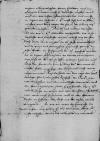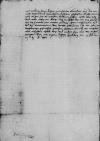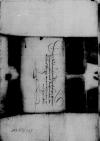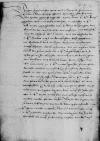Wir haben gestrigs tags bei diesem boten Ewer Erbarkeit ⌊⌋ erhalten / und mit vleis uberlesen, / in welchem Ewer Erbarkeit uff unser negst ⌊⌋, vom ⌊Elbing⌋ ausgangen, / uns beantworten / und doneben uns anzeigen, mit uberschickung der abschrift koniglicher citacion / und des abschiedts, der Ewer Erbarkeit sindico negst an koniglichem hoffe gegebenn, / ire beschwerd und anliegen, / dorinnen auch unsers raths begeren, / dorbei erinnern, / das wir unserm vaterlandt, der guten ⌊stadt⌋, / die Ewer Erbarkeit sorgfeldigkeit und ir bestes zu wissen bevolhen, / vilmals sein forderlich gewesen, / auch von uns vilmals haben horen lassen, / das wir niemants in Ewer Erbarkeit mittel gesessen, / zuvorgeben, / der alle wolfart und glucklich zunehmen derselbten stadt, / in der wir erstlich das leben entfunden, / lieber dan wir mocht sehen, / derwegen sich Ewer Erbarkeit mehr dan gewislich aller gunst und freuntlickeit bei uns vorhoffenn etc., welchs alles wir gerne haben eingenommen / und gestendig sein / uns auch zu jeder zeit gen Ewer Erbarkeit, unser profession und pflicht nach, / nicht anders wollen finden lassen, / derhalben unsern rath, / so weit sich unsers vorstands kleinigheit erstreckt, / Euer Erbarkeit gerne wollen mitteilen, / nemlich, dieweil wir auss Euer Erbarkeit schreiben vorstanden, / das weiter zeit dis putzker handels / bis auff zukunftige ⌊tagfart⌋ / von ⌊koniglicher maiestet⌋, unserm allergnedigsten herren, zubitten / nach entpfangner citacion / nicht zu der sachen nutzlich. / Wurd auch, / wie wirs achten, / schwerlich erhalten / und mochte in diesem vor nehmen Ewer Erbarkeit mehr last und unbekuemigkeit, / umb kurtz wegen der zeit / in der ladung ausgedruckt, / entstehen. / Aus der und andern ursachen las wir uns Euer Erbarkeit bedencken wolgefallen, / das es zutreglicher und fueglicher wil sein, / etliche aus der hern ⌊rethe dieser lande⌋ mittel, / die bei hoffe unvordechtlich / und do gunst und freuntschaft, / auch nicht geringe ansehen hotten, / an hochgemelte ⌊konigliche maiestet⌋ geschickt wurden, / die in diesem falh, / nachlaut des landes privilegienn, / diese sache bei koniglicher maiestet hulffen orternn, / wie wir auch solchs den herren, / die zum ⌊Elbing⌋ koniglicher kemmerer betreffen, / haben angezeigt, / das dazumall nicht wartt angenommen, / auch dasselbte von uns negst dem hochwirdigen hern ⌊colmischen bischoffe⌋, / den grosmechtigen ⌊marienburgischem und pommerellischen woiwoden⌋ / und den hern ⌊castellanen⌋ haben ⌊⌋, / des Euer Erbarkeit weitleuftiger eingelegte copei wirt berichten. / Hirumb were weiter nicht zuseumen / und bei den herrenn ⌊rethen⌋ anzuhalten, / das solchs mit den ersten wurdt vortgestelt. / An uns / von wegen der zuvorsicht, / die wir achten, / aus gutem zu uns vortrauen / fleust, / sol nichts abgehen, / domit dis alles schleunig ins werck mocht kommen. / Das sich aber Euer Erbarkeit der citacion halben, / die mit ungebreuchlichen hie im ⌊lande⌋ clauseln geschrieben, / fast bekommern, / bedunckett uns unnottig. Euer Erbarkeit tragen gut wissen, / das wir von jugent auff in der ⌊Cron⌋ cantzlei gewesenn, / der stilus in solchen citation uns nicht unbekant ist. / Mugen uns auch nicht anders erinnern, / dan das zuvor alwegen, / auch in kleinen sachen, / so einer den andern zu recht fordert, / dermassen / und mit dergleichen worten geschrieben wirt, / des hoffens auch sein, das von Euer Erbarkeit des jenige / nach laut der worte, / wie sie die vorstehen, / nicht muge gesucht werden, / worinne wir mit rath, hulff / und beistand, / so solchs wurd vorgenommen, / unser muglicheit nach Ewer Erbarkeit / und die gute ⌊stadt⌋, unser vaterlandt, / nicht wollen vorlassen. / Des sol sich Ewer Erbarkeit zu uns gentzlich vorsehen. / Gotlichen gnaden bevolhen. /





